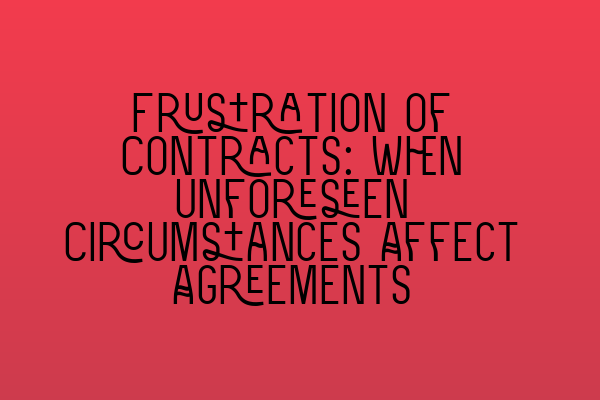Frustration of Contracts: When Unforeseen Circumstances Affect Agreements
Contracts are an essential aspect of business and personal agreements, providing a legal framework for parties to fulfill their obligations and protect their interests. However, there are times when unforeseen circumstances arise, rendering the performance of a contract impossible or fundamentally different from what was originally intended. In such situations, frustration of contracts comes into play.
But what exactly is frustration of contracts? How does it affect the parties involved, and what legal implications does it carry? In this article, we will explore the concept of frustration of contracts and its impact on contractual obligations.
Understanding Frustration of Contracts
Frustration of contracts occurs when an unforeseen event makes it impossible for the parties to fulfill their contractual obligations, thereby undermining the fundamental purpose of the agreement. These events are beyond the control of the parties and are not due to their fault or negligence.
Examples of events that can lead to frustration of contracts include natural disasters, war, government regulations, or the death or incapacity of a person crucial to the performance of the contract. It is important to note that mere difficulty or inconvenience is not sufficient to claim frustration. The event must render performance impossible or fundamentally different.
When frustration of contracts occurs, it may release both parties from their obligations under the agreement. However, the doctrine of frustration is narrowly interpreted by the courts, and each case is analyzed on its own merits.
Legal Implications of Frustration of Contracts
When a contract is frustrated, the parties are relieved from further performance. However, the consequences of frustration can vary depending on the circumstances and the terms of the contract.
In some cases, frustration may result in the contract being automatically terminated, with both parties being released from their obligations. This means that any outstanding duties or future obligations under the contract are discharged.
However, in certain situations, the contract may be temporarily suspended rather than terminated. If the frustration event is temporary, the contract may resume once the impediment is removed, allowing the parties to fulfill their original obligations.
It is important to note that frustration of contracts does not entitle the parties to claim damages for breach of contract. Instead, any payments made before the frustration event occurred will usually be recoverable.
Case Law and Judicial Interpretation
The concept of frustration of contracts is established through case law and judicial interpretation. Over the years, several landmark cases have shaped the legal understanding of frustration, providing guidance and precedent for future disputes.
One such case is Exploring the Impact of Frustration on Contractual Obligations: Legal Insights, which delves deeper into the legal principles and tests applied by the courts to determine frustration.
Managing Frustration Clauses
Given the potential complexities surrounding frustration of contracts, it is advisable for parties to consider including frustration clauses in their agreements. Frustration clauses outline the consequences of unforeseen events and provide a mechanism for dealing with the impact of such events on the contractual obligations.
Interpreting and understanding contractual clauses is a critical skill in contract law. For more insights on interpreting contractual clauses, refer to the article Interpreting Contractual Clauses: Unlocking the Hidden Meanings.
Seeking Legal Advice
When facing a situation where frustration of contracts may arise, seeking legal advice is crucial to understand your rights and obligations. Contract law can be intricate and the specific circumstances of each case can greatly impact the outcome.
For entrepreneurs and individuals dealing with business contracts, it is important to be aware of the legal aspects involved. Check out the article on Legal Aspects of Business Contracts: Key Considerations for Entrepreneurs for a comprehensive understanding of the key considerations in business contract law.
Conclusion
Frustration of contracts is a legal doctrine that addresses unforeseen events that render the performance of a contract impossible or fundamentally different. It can have significant implications for the parties involved, potentially releasing them from their obligations under the agreement.
Understanding the concept of frustration of contracts and its legal implications is crucial in navigating contractual disputes. By considering the inclusion of frustration clauses and seeking legal advice when necessary, parties can better protect their interests and ensure a fair resolution.
For more information on different types of agreements in contract law, read the article on Agreements in Contract Law: Understanding Its Various Types. Additionally, to grasp the basics of consideration in contracts, refer to the article on Essentials of Consideration: Understanding the Basis of Contractual Exchange.
